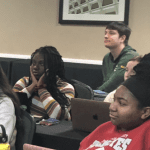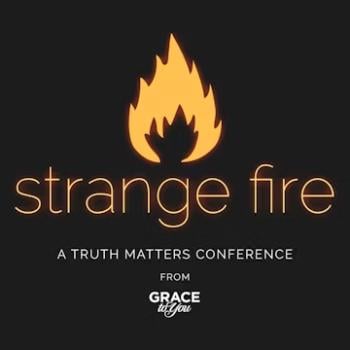Earlier today, Tuesday May 9, Collin Hansen released an interview with historian Molly Worthen on his podcast, Gospel Bound. What unfolded in the interview was the surprising narrative of Molly Worthen’s evangelical conversion to Christianity.

Who Is Molly Worthen?
Worthen grew up in Glenn Ellyn in what she described during the interview as a secular home. She completed a Bachelor of Arts at Yale in 2003 and completed her Ph.D. there in 2011. In 2010, she married Michael Morgan, a Ph.D. from Yale (2010) and a professor of international and global history at the University of North Carolina, Chapel Hill.
Worthen is an Associate Professor at the University of North Carolina, Chapel Hill. She is an expert in American religious and intellectual history and has produced courses with The Great Courses, including The History of Christianity II: From the Reformation to the Modern Mega Church. She is a highly regarded journalist with numerous pieces published in the New York Times, most recently among these pieces includes “How Would You Prove that God Performed a Miracle?”. One of the most significant journalistic pieces that she has written for evangelical audiences is her 2010 cover story for Christianity Today, “The Reformer,” which profiled Southern Baptist Theological Seminary’s President, Al Mohler.
Her 2013 Oxford publication, Apostles of Reason: The Crisis of Authority in American Evangelicalism, established her as a leading expert in the history of modern evangelicalism. While a penetrating and perceptive interrogation of the rise of the neo-evangelical movement, her book also included fascinating anecdotes or asides, like Wes Craven’s studies at Wheaton College and Mark Noll’s correspondence with Francis Schaeffer. More significantly, her work brought attention to denominations adjacent to insider neo-evangelicals, who struggled to earn respectability and inclusion at the neo-evangelical table.
Why Is Worthen’s Story Significant?
I cannot possibly summarize the 90-minute conversation between Hansen and Worthen, which I commend for your listening pleasure.
As a Christian historian, I am immensely fascinated with the history of evangelical conversion and personal narratives. I find them both encouraging to my soul and enlightening for understanding the history of the evangelical story. Worthen’s recount of her conversion warmed my heart. She displayed a meekness, curiosity, and enthusiasm concerning her spiritual life and how it fits into the longer narrative of evangelical history.
Obviously, it’s a little early to make any bold claims about the noteworthiness of Worthen’s conversion. Good fruits require healthy soil that foster deep roots. Time will tell the staying power of Worthen’s conversion. Nonethless, her conversion may prove to be one of those remarkable evangelical conversion narratives that will hold a prominent place in the annals of notable evangelical conversions for the 21st century.
For this reason, I wish to comment on elements of the interview that shed light on the long history of evangelicalism and a few of its features.
Networks and Respectability
Evangelicals are concerned with networks and respectability. I believe that the whole project of writing evangelical history is part a perennial quest to gain respectability for evangelicals. Evangelical respectability is created by defining what networks represent the finer features of evangelicalism and how to spotlight those features, while carefully concealing, forgetting, or overlooking unsightly elements from the evangelical past. Stigmatizing or marginalizing deplorable features by placing them into a fundamentalist category and network has been one way to conceal blemishes in the evangelical story. Timothy Gloege described this phenomenon in his Religious Dispatches article, “#ItsNotUs: Being Evangelical Means Never Having to Say You’re Sorry.”
Particular networks of evangelicals are signaled to throughout Hansen’s interview with Worthen. Sometimes those networks are in tension with one another, like Christianity Today and the Calvinists. At other times, those networks are in cooperation with one another, such as the publishing house Crossway, “a neighbor” to TGC. Sometimes networks fail to meet expectations. When Hansen inquired about Worthen’s upbringing so near to Wheaton College, his inquiry seemed to subtly reproach the Wheaton evangelical hub for failing to midwife Worthen’s spiritual birth.
Worthen distinguished the evangelical network by contrasting it to more “respectable” groupings of Christianity. According to how Worthen maps the association of evangelicals, she contrasted “respectable” Christianity, characterized with high-liturgy—primarily Catholicism, Anglicanism, or Eastern Orthodoxy—to other groups, like the Southern Baptist Church or Mega-churches like Summit Church.
To Worthen, respectable academic culture was more likely associated with respectable forms of Christianity. As such, she repeatedly brought up the allure of Catholicism to her, while maintaining the historic distinction between Catholicism and evangelicalism.
One of Worthen’s pre-conversion hang-ups had concerned what network she assumed she would most likely find a Christian home. Since she had always had an affinity for respectability, she assumed she would find a Christian home within the orbit of respectable Christianity, a network that matched her respectable academic environment.
That said, the significance of placement within the evangelical network and a search for respectable Christianity emerged as a trope in Worthen’s narrative. The initial placement of her conversion narrative announcement within the TGC network seems to be the natural result of her spiritual birth being midwived by J. D. Greear and Timothy Keller.
Status
Since evangelicals are on a perennial quest for respectability, achieving a credible, respectable status is vital to the prosperity of the movement. The evangelical feature of networks indelibly leads to the notion of status, especially in consideration of the noteworthy place Worthen had already put upon respectability. In order to overcome the hang-up of respectability, some sort of evangelical respectability had to be developed.
Worthen’s conversion narrative features the roles of notable evangelical leaders’ interest in her conversion. J. D. Greear, Lead Pastor of Summit Church and former President of the SBC, is the key evangelist in the narrative. He enlisted supporting evangelist Timothy Keller. Can a person find two more eminent evangelicals, a Baptist and a Presbyterian, to birth their spiritual life? Worthen unashamedly felt honored that two noteworthy evangelicals treated her with such interest and enthusiasm. Greear and Worthen engaged in a detailed email correspondence. Greear, Keller, and Worthen met numerous times via Zoom to discuss the claims of Christianity.
Worthen’s status as a highly-regarded American religious and intellectual historian plays no small role in the noteworthiness of her conversion. Why else would it be on a TGC podcast? Responses from evangelical personalities on Twitter reveal their intrigue and excitement. For instance, evangelical historian John Fea tweeted, “I am so encouraged by this interview.”
At the same time, the interview alluded to the anxiety that might accompany a newly converted evangelical, who occupies a notable place in secular academia. What sort of fallout might come from such a reformation of the soul? Might Worthen lose status among her peers? Might there be fallout for her with her employer?
Reconciliation Yet Ongoing Tensions to Manage
The interview conveys the feature of reconciliation yet ongoing unresolved tensions that have to be managed. Primarily this is observed through the demeanor and disposition of Worthen.
Neither Hansen nor Worthen shy away from how evangelical leaders had not always been receptive to the more critical elements of Worthen’s scholarship.
The two make passing comments about her 2010 Christianity Today profile on Al Mohler. These comments, though seemingly picayune, hint at the long tension within evangelicalism between its conservative and progressive wings. Since neo-evangelicals reinvented and rebranded fundamentalism, Christianity Today Magazine has functioned as an intellectual and cultural organ for the movement. Control and representation among its staff, content, and ethos has proven to be a battleground for those two contending wings of evangelicalism, and it has required finesse for its leadership to manage this tension.
Worthen repeatedly demonstrated a self-effacing disposition and displayed a winsome demeanor as she navigated those tensions, and she fostered an ongoing posture of reconciliation concerning any inadvertent sleights resulting from her past interrogation and critical examination of the evangelical movement. Overall, her meekness concerning her newfound evangelical faith and enthusiasm for participating in the life of the evangelical movement was affecting.
Friendship
Worthen emphasized the significance of friendship in her conversion narrative. The context of friendship was key for her conversion. She also made an open-handed gesture offering friendship and inviting friendship, especially from mature people that relate to her niche. I hope my colleagues at the Anxious Bench and others within our network of evangelical historians will reciprocate. I hope Molly Worthen finds a welcoming home at The Conference on Faith and History. She’s also always welcome to make a guest contribution to the Anxious Bench.
Much more could be said concerning this interview. I hope other historians and news outlets cover the story.













